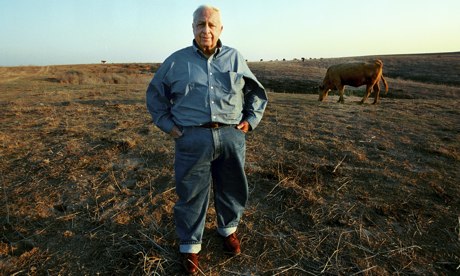IN THE MEDIA
Ariel Sharon, from warrior to peacemaker
January 16, 2014 | Sharyn Mittelman

Sharyn Mittelman
Canberra Times – January 16, 2014
Israel’s former prime minister Ariel Sharon passed away on January 11. Debate about his legacy will continue for years.
Views about it have already changed since he became incapacitated eight years ago, as today many on Israel’s left praise his decision to dismantle the settlements in the Gaza Strip and parts of the West Bank he had helped sponsor, while on Israel’s right, many mourn his ”mistakes” as Hamas took hold of Gaza and used it to fire rockets into Israel.
He left Israel with a legacy that includes the model for a two-state peace that is being avidly pursued by US Secretary of State John Kerry, a major realignment of Israeli politics to create a new centrist voting bloc, and force a new Israeli consensus, drawn from elements of both the traditional right and the traditional left.
This centrist bloc acknowledges the necessity of a two-state peace but accompanies this with serious scepticism over the willingness and ability of the Palestinian leadership to make this a reality.
One of Israel’s last statesmen of the founding generation, Sharon’s life was intimately bound up with the history of the state of Israel. Considered to be one of Israel’s greatest military strategists, Sharon played critical roles in the 1948, 1956 and 1967 wars, before the 1973 war saw Sharon’s most famous military exploit, when his reserve division counter-attacked across the Suez Canal, leading to the encirclement of much of the Egyptian army by war’s end.
A maverick in the military, he became a maverick in politics. He mostly served with the Likud party, but was never a committed adherent of the ideologies of either the right or the left.
Sharon served in numerous ministries, but his career went into eclipse when, as defence minister during the 1982 Lebanon war, he was found by Israel’s Kahan inquiry to bear indirect responsibility for the Sabra and Shatila massacre, ”ignoring the danger of bloodshed and revenge” by the Lebanese Christian Phalangists who carried out the atrocity. He was urged to accept ”personal” responsibility and resign.
Despite this controversy, Sharon’s career recovered and he became prime minister in 2001 in the midst of the Second Intifada. Sharon is often wrongly accused of sparking that Intifada due to his 2000 visit to the Temple Mount.
However, numerous Palestinian leaders, including Yasser Arafat’s wife, Suha, have acknowledged that Arafat was determined to start an intifada in any case.
In response, in 2002 Sharon launched Operation Defensive Shield and built the security barrier along the West Bank that, while controversial internationally, reduced suicide bombings to almost zero in just a couple of years.
He then endorsed the Road Map for Peace, committed to the establishment of a Palestinian state and, stunningly, decided Israel would unilaterally withdraw from Gaza, dismantling its 21 settlements, as well as four settlements in the West Bank. Some believed that because Sharon helped build the settlements, he could take them down – he also did this in Yamit in Sinai in 1982. Asked about his reversal on settlements, Sharon said: ”What you see from here, you don’t see from there.”
Sharon’s strong relationship with US president George W. Bush led to an official 2004 letter in which Bush agreed ”it is unrealistic to expect that the outcome of final status negotiations will be a full and complete return to the armistice lines of 1949”. The formula in the letter became US policy, which envisioned that in a peace deal Israel would keep the large settlement blocs near the border in exchange for land swaps with the Palestinians. This is the formula Kerry is trying to get the sides to adopt at the moment.
Sharon’s decision to leave Likud on November 21, 2005, and establish a new centrist party, Kadima (”Forward”) signalled a major realignment of Israeli politics.
His massive stroke in January 2006 prevented him contesting the March 2006 election but, had he won, he was expected to make additional withdrawals in the West Bank. Kadima still went on to form government under Sharon’s deputy, Ehud Olmert, the first government in Israel’s history led neither by the left-leaning Labor movement nor the right-leaning Likud.
While Kadima has faded since, the rise of other centrist parties means that a strong political centre is now an ongoing reality in Israeli politics.
There is now a near consensus in Israel, thanks largely to Sharon, encompassing all major parties of the centre-right, centre and centre-left, and more than 75 per cent of the population believe that Israel must seek a two-state peace with the Palestinians. But, like Sharon, this ”consensus” is extremely concerned about an inability or unwillingness of the Palestinian leadership to unequivocally end the conflict in exchange for such a peace.
Today, many in Israel express a longing for Sharon’s style of leadership, which went beyond the left-right divide, and pushed strong action – in war and in peace – to secure Israel’s future as a Jewish and democratic state.
Few leaders in Israel have been able to bring such national consensus as Sharon ultimately achieved, and fewer leaders have had as great an overall influence on their country as Ariel Sharon had over Israel in his 60-year career.
Sharyn Mittelman is a senior policy analyst at the Australia/Israel & Jewish Affairs Council.
Tags: Israel





